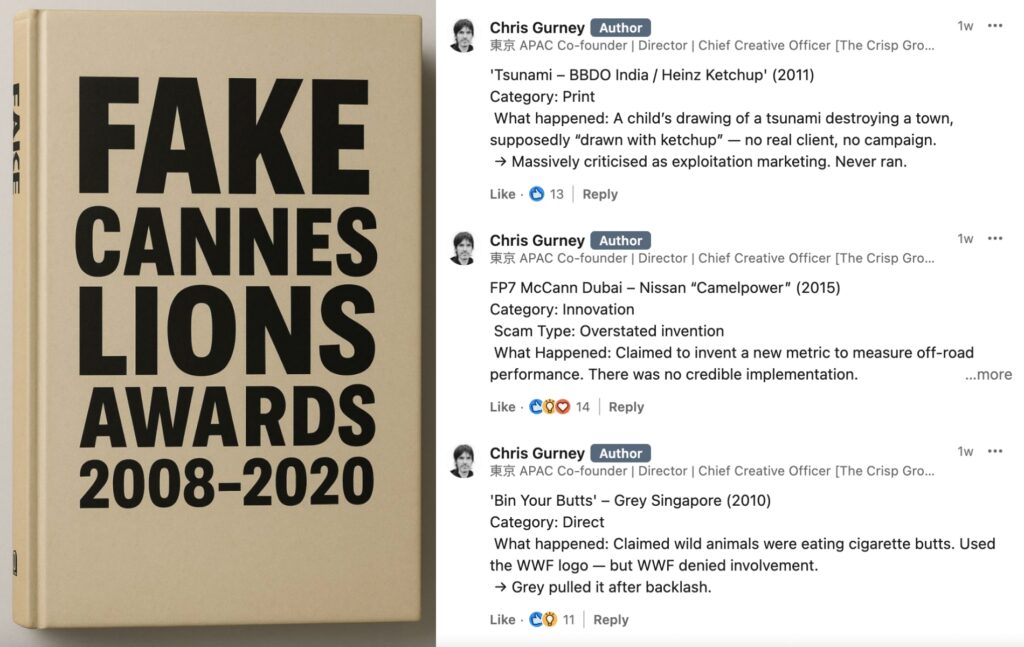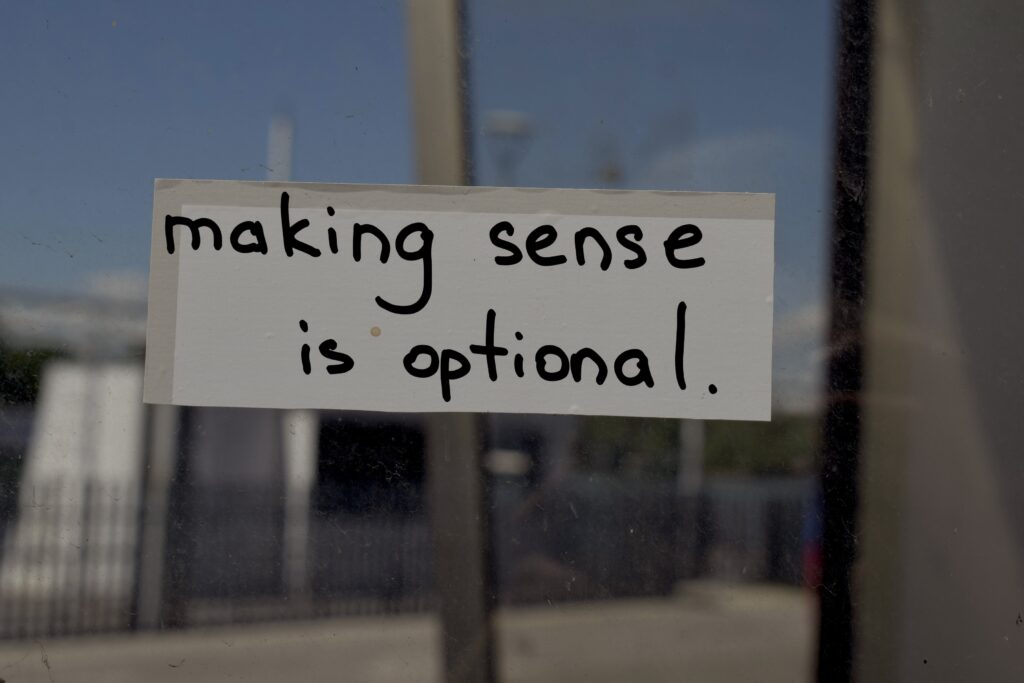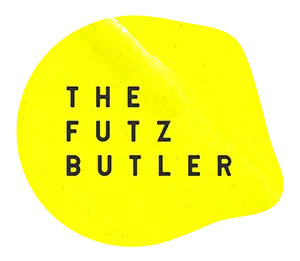Awards are a bit of a dance. A prosecco-soaked facade.
We all know it. But nobody wants to talk about it. And to a lot of us, the whole thing feels a bit… unedifying.
Stick with me here…
Yeah, we’ve won awards. Plenty. And everyone and their dog markets themselves as award-winning. Yawn.

It’s becomes pretty meaningless. It’s an opinion economy. Not a merit economy.
I’m not saying there’s no value in celebrating great work – but I’m just not sure that’s really what awards are about, despite what they say on the tin.
And I’m not alone in this concern.
There’s a growing backlash against the ingrained elitism and gamification of the major Adland awards process. And I think as an industry, we need to take a closer look at what’s going on in our own creative back yard…
The ‘What’s In It For You?’ Question
First off, let’s talk about the basic premise.
These awards, right? They’re meant to recognise the best of the best. But here’s what no-one seems prepared to say…
most award-winning campaigns are designed with the sole purpose of winning awards, not delivering results
The campaign isn’t for the audience. It’s not even really for the brand. The campaign is for the shiny trophy on the mantelpiece by those who worked on it.

You see it all the time. Agencies pulling out all the stops to make sure their work gets noticed at these ceremonies. But, at the end of the day, does it really matter to the people they’re supposed to be influencing? Does the consumer care whether a campaign won an award?
Nope.
Lessons of Shame, from Havas Costa Rica and World Vision, claimed to have stopped a national education budget cut in its tracks. Claimed to have swung presidential campaign pledges. Claimed to have sparked a $73 million increase in education funding – overnight.
Bold stuff. Awards-worthy stuff.
Except… none of that is verifiable.
Not the budget increase. Not the parliamentary protest. Not even the footage. Just a lot of uncheckable claims and convenient camera angles.
Let’s be honest: if proof is now optional, what are we really awarding?
This is the sixth campaign from Cannes this year alone to be publicly challenged on its legitimacy.
Brazilian agency DM9 pulled three of it’s entries including its Efficient Way to Pay campaign from Cannes after after it was found to have used AI and other forms of manipulation in its case study to overstate the campaign’s efficacy. This was after the work had already won a Grand Prix and a Bronze.
Cannes, like many awards shows, has increasingly become a theatre of smoke, mirrors, and case-study fiction
APAC co-founder Chris Gurney is on a scorched Earth mission to reveal the point-blank corruption going on the drives so many relationships in Adland. He’s released a ‘book’ on Fake Cannes Awards – naming names, campaigns and the underhand agency tactics used to bring home the bacon. The sheer number of cases stretching back over 12 years is damning reading, shining a stark spotlight on the depth and insidiousness of the issue.

It’s the tail wagging the dog. We’ve got things back to front.
When Adland eats itself
Mark Ritson, in collaboration with System1 and Effie Worldwide, has long thrown a sharp elbow at the Cannes Lions status quo, revealing that many award-winning campaigns fail to deliver actual business results.
Based on data from 30,000 consumers, his research shows a consistent disconnect between creative acclaim and market impact, arguing that while Cannes often celebrates emotional or purpose-driven work, it too often overlooks effectiveness. Ritson champions the “Creative Dividend” – the measurable profit from emotionally resonant campaigns that truly move the needle – and stresses that creativity is a means, not an end. As debate brews in the Croisette, Ritson’s message is clear: if it doesn’t sell, it’s not smart.
It’s not that the work isn’t good – it’s just that the incentives are misaligned. The drive isn’t to make great work for the brand’s customers; it’s about winning that elusive trophy
The audience wants to connect with something that feels authentic and meaningful. Awards? They’re a by-product – not THE product.
Genevieve Thompson, CEO of Goodstuff Communications is advocating for wholesale change in how we benchmark what gets awarded. “Results first. If they can’t prove that the campaign worked, no idea should be good enough to make the cut.”
The Cost of Creativity
Let’s have it right, most awards aren’t about the work – they’re about making money
If they weren’t the entries wouldn’t be so eye-wateringly expensive. The sponsorships wouldn’t require a second mortgage.
When we attend, everybody goes to be seen, to hustle and network first and foremost, and celebrate the work second. Because we’ve all dropped at least several bags on just being there…often much more. So there’s a distinct sense of seeking an ROI. Which in turn demotes the work to an indulgent afterthought unfortunately (D&AD I would say is one notable exception here).
I don’t believe creativity is a sport. The zero summing / competition-ising of creativity and the idea that one idea is creatively better than another homegenises taste and subjectivity.
Which is why the barometer for how we award work should be skewed more squarely towards how creativity delivers effectiveness. Which is at the end of the day it’s raison d’etre.
Ideas without results… is just vanity.
It’s time to address the elephant in the room – the main purpose of awards is marketing, not celebration of ideas
I guess a broader question is – is there anything wrong with this? Hear me out…
Is it that different from simply buying ad space? You’re buying a marketing tool. An award is something to help you get your next gig.
But let’s not dress it up as a level playing field, based on the brilliance and effectiveness of what was set out to be achieved eh? Because that’s just bollocks.
And I find this facade, pretty unpalatable.
Awards as such, are then mostly there to inform you how you should feel about someone or something – without having to meaningfully engage with them or their work. It’s won an award. Therefore I must think it’s good.
Awards are a flawed shorthand for a time-pressed people
Adland’s 1%
And what about how most awards are judged?
Let’s call it what it is. A f**king cartel.
Most advertising awards are usually won by the agencies and companies that throw the most money at entries and sponsorship. And sure, I guess there’s a statistical element here – the more you enter, the more chance you have.
But I think we can all spot a bit of inside influence when it’s happening.
Richard Brim, Ace of Hearts Founder recently wrote in Campaign “We all know what’s going on. We can’t plead ignorance to the gamification – it’s so obvious. The juries are announced and phone numbers and emails are circulated. People are marked, and the endless, slightly passive-aggressive, trading WhatsApps are sent: “If you could look out for my X, I’m sure my colleague could look out for your Y.” I’m not sure most of our behaviour in the pursuit of “winning” is right.”
In many ways, these ceremonies end up becoming a bit of an echo chamber.
Industries judging themselves always runs the risk of things becoming self flagellating. I remember coming back from a gig in Germany, and seeing an advert for the Best Airport in Munich awards. Surprisingly, the Munich Airport award went to Munich airport. Imagine that?
It’s a cycle that feeds itself, but does it help foster truly disruptive creativity? Not so much. The loudest voices are often the ones that are already established, and the ones with the best PR teams. And the deepest pockets.

The Bottom Line: Let’s Get Back to Purpose
Ultimately, advertising should be about more than just awards and recognition. It should be about creating campaigns that resonate with people, that spark something real. That promote change. And ultimately sell s**t. That’s kinda why we’re here (whether our ego lets us address it or not, right)?
Andrew Barnard (Barney), co-founder of 20 Something, recently described the status quo saying “Awards are a problem – the industry is clapping itself into the abyss,” highlighting with the wave of change being propelled by AI, mistaking self-congratulation for relevance, might cost us everything. I think he has a point.
Sure, it’s nice to get a trophy, and be recognised by peers – but the question is: what’s the bigger goal? To win a gold statue or to move hearts and minds? I know what I care about…and its not the oddly-shaped gongs gathering dust in our studio.
At the end of the day, we need to remember that creative awards are just that – awards. They’re an opinion dressed up as acknowledgment of a job well done – if your goal was to win an award.
But they’re not the reason we create.
So let’s stop getting caught up in the glittering distractions of shiny trophies and remember what really matters: making work that leaves a lasting impression on the world, not just the bubble of Adland.


